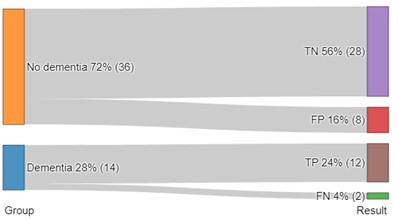Category: Technology
Objective: The aim of the clinical study was the assessment of efficiency of the screening diagnositics method for dementia by speech using AI-based technology (BRAINPHONE project). The method used is trained neural network (NN) with more than 500 unique audiorecords of speech of patients with dementia vs healthy volunteers (50/50%).
Background: Recently, a large number of publications have appeared on the testing of digital tools for the diagnosis of dementia [1-4]. Here we represent our clinical experience.
Method: In the cohort clinical study 50 patients were included in a continuous manner. Every patient was assessed by the experienced neurologist and the diagnosis for “dementia” or “No dementia” was made in every case according the result of MOCA test (16 score – threshold). The clinical trial was performed on the base of Republican Consultative and Diagnostics Center for Movement Disorders (Kazan, Russia). After the clinician’s assessment the digital diagnostics tool assess cognitive status via the spontaneous speech of the patient. The trained NN output was “Signs of dementia” (counted probability of 0.5 and higher) and “No signs of dementia” (counted probability less than 0.5). The statistical analysis was performed with DATAtab [5].
Results: General characteristics of evaluated population are presented in the Table 1.
The two-factor analysis of variance showed that there is no significant difference between the groups of female and male volunteers in relation to the age (p=0,6), but there is a significant difference between the groups of demented and non-demented patients in relation to age (p=0,016).
The results of the evaluation by the digital assessment tool are presented on the Fig.1.
The sensitivity of the screening diagnostics via digital tool achieved 86% and specificity – 93%.
Conclusion: AI-based speech diagnostics via trained NN shows good results in primary clinical trial with high sensitivity and specificity results. Potentially, diagnostics using trained NN can be applied as a screening tool.
Results of the AI-based diagnostics of dementia
General characteristics of evaluated population
References: 1. Battineni G. et al. Artificial intelligence models in the diagnosis of adult-onset dementia disorders: A review //Bioengineering. – 2022. – Т. 9. – №. 8. – С. 370.
2. Thabtah F. et al. A review of dementia screening tools based on mobile application //Health and Technology. – 2020. – Т. 10. – С. 1011-1022.
3. A Thabtah F. et al. Dementia medical screening using mobile applications: A systematic review with a new mapping model //Journal of Biomedical Informatics. – 2020. – Т. 111. – С. 103573.
4. Liu D. AI for Dementia Detection: Open AI Health Diagnostic (OAHD) : дис. – Harvard University, 2023.
5. DATAtab Team (2024). DATAtab: Online Statistics Calculator. DATAtab e.U. Graz, Austria. URL https://datatab.net
To cite this abstract in AMA style:
I. Khasanov, D. Khasanova. Artificial Intelligence Opportunities for Diagnostics of Dementia via Speech (Brainphone Project) [abstract]. Mov Disord. 2024; 39 (suppl 1). https://www.mdsabstracts.org/abstract/artificial-intelligence-opportunities-for-diagnostics-of-dementia-via-speech-brainphone-project/. Accessed July 5, 2025.« Back to 2024 International Congress
MDS Abstracts - https://www.mdsabstracts.org/abstract/artificial-intelligence-opportunities-for-diagnostics-of-dementia-via-speech-brainphone-project/


